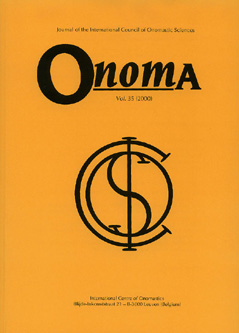 previous article in this issue previous article in this issue | next article in this issue  |

|
Document Details : Title: Arabic Orthography and African Place-names in the Sudan Subtitle: Can a Conflict between Diverse Solutions be Resolved? Author(s): BELL, Herman Journal: Onoma Volume: 35 Date: 2000 Pages: 321-355 DOI: 10.2143/ONO.35.0.574381 Abstract : It has been claimed that the Standard Arabic writing system can provide an accurate representation for geographical names in African languages. The claim is investigated here and rejected. Subsequently, this study investigates the problem of creating appropriate Arabic-based orthographies and evaluates a number of solutions. The study relates particularly to the Sudan which has a large number of African languages alongside Arabic, the official language. The African languages are phonologically different from Arabic and there have already been a number of different solutions for representing them in an Arabic-based orthography. The ease with which new computer fonts can be designed will lead to an even greater diversity of solutions in the future. Diverse solutions create confusion. They also create the need for a concerted effort towards standardization. Muḥammad Chtatou has called for an International Arabic Phonetic Alphabet (IAPA). Others have claimed that such an IAPA is not possible. This claim is investigated within the framework of Yves Le Clézio's typology of Arabic-based orthographies for African languages of the Sudan. It is concluded that such an IAPA is technically possible, but that it would be difficult to teach and difficult to implement. Its most likely function would be to display phonetic information in a gazetteer. Geographical names on maps would normally be presented in a simpler form. What solutions for geographical names will the Sudanese people find acceptable? What balance should be struck between local solutions and global solutions? Should ambiguous values for Standard Arabic characters under the influence of local colloquial dialects be tolerated? Or should new characters be created or imported from foreign languages such as Farsi? Local solutions are familiar and less expensive, but global solutions may have long term advantages. Influential centres with an interest in international standardization such as the Islamic Educational, Scientific and Cultural Organization (ISESCO) in Rabat, encourage global solutions, where feasible. A National Committee for Geographical Names has been established to deal with these issues in the Sudan. All options are being explored including the possibility of an electronic audio gazetteer. The Committee welcomes relevant suggestions from the international community. |
|
